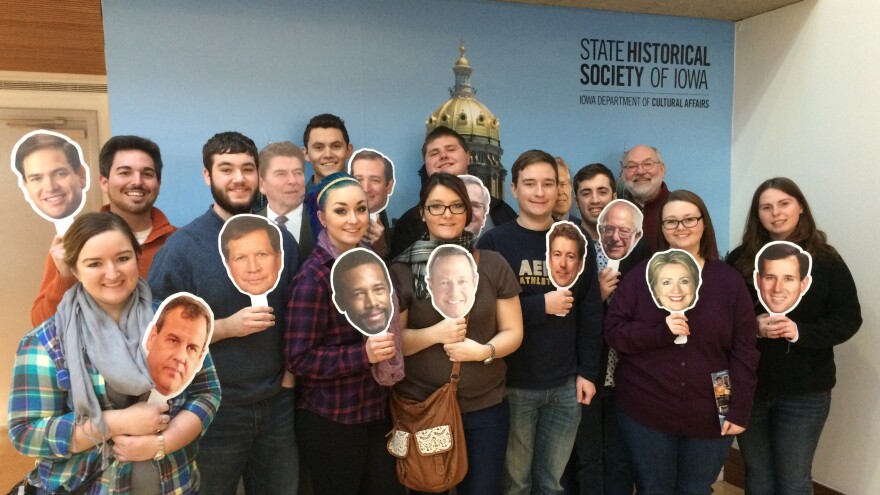It's easy to get cynical about the presidential campaign, especially so close to the first round of voting, when many candidates are on the attack.
But see it up close and personal, and the process can feel a bit more charming. That's what a class from Indiana's Manchester University found as it traveled across Iowa last week, taking in the caucuses.
Instead of spending their winter break relaxing or earning some cash, 11 students from the small liberal arts school opted into a January course, piled into a red van with suspect heating, and braved the Iowa cold to experience the caucuses first-hand.
They spent a week driving across Iowa, catching events held by Hillary Clinton, Bernie Sanders, Ben Carson, Chris Christie, Marco Rubio, Chris Christie, Donald Trump, and Rick Santorum.
They even stood on stage behind Vermont Senator Bernie Sanders. As sophomore Tate Wooding put it, "we got a great view of his head."
One of the most surprising things for students who are used to watching politics on the news: how up close and personal the whole thing is. "The candidates are actually people, and they will actually sit and talk to you and be with you if they have time for it," said Kathryn Hickman.
It's one thing to see a candidate on a stage. It's another to watch them hang out with voters in a bar, answering every question that comes their way. "It makes politics seem more real here," said Ashlyn Leamon. "Because it's not just on a TV screen. You can actually see them and be with them.
The realization that, hey, one of these people will be the next president of the United States, "kind of encourages, like, oh yeah I've got to get a selfie just in case," Leamon said.
Some of the candidates impressed more than others, when it came to the in-person politics. Many in the class were blown away by how much detail and attention New Jersey Gov. Chris Christie provided to every questioner in his town halls. "I actually cried at his event because it was really personal," said Hickman.
Christie has made one-on-one politicking a hallmark of his late push in Iowa.
Several students said that Florida Senator Marco Rubio, on the other hand, mostly repeated answers they had already heard in his debate appearances. And many were surprised to see that front-runner Donald Trump mostly talked about poll numbers during his event.
Every four years, there's a lot of talk about whether Iowa should be the first state to have its say in the electoral process. After spending a week here, many of the Manchester University students all believe Iowa deserves it.
They were all struck by how much Iowans care about the process – how early they arrive at events, how focused they were on the details when asking questions. "When we were at Chris [Christie's event], there was a kid that asked a question," said Danielle Robertson. "It was a really good policy question that most kids in other states would have no clue what to do with."
Matt Pritz, a recent convert to political junkiedom, was thrilled to see how politics permeates so many conversations. "In Iowa, it's common. And you see it each and every day – people talking about their candidates. Who they're going to caucus for. Stuff like that. But in Indiana, you don't tell people who you're going to vote for. That's more private."
Of course, only a small percentage of Iowans typically show up on caucus night.
Still, Pritz said all that up-close access to candidates aside, it's the people at the rallies who will really stick with him. "To see kind of the guts ot the campaign, that kind of gave me butterflies," he said.
The spring semester will have resumed by the time Iowans vote February 1 but according to their professor, Leonard Williams, they're planning to all get together to watch the caucus results come in.
Copyright 2021 NPR. To see more, visit https://www.npr.org.



